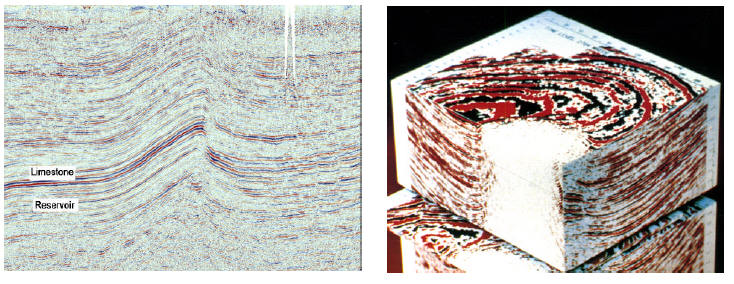|
GEOL 581
GEOPHYSICAL EXPLORATION
3 credit hours
- Exploration Geophysics of the Shallow
Subsurface, H.Robert Berger
- An Introduction to
Applied and Environmental Geophysics, John M. Reynolds, 2004, John Wiley
and sons, 796 pages.
- Field Geophysics,
John Milson, 2002, 232 pages.
- Geophysical Methods, Robert
Sheriff, 1989, 605 pages.
- Basic Exploration Geophysics, JRobinson,
E. S., and C. Coruh, ohn Wiley, 1988
-
Readings: Assigned readings will be made from the lists of
published case histories to select from are linked in the syllabus below
or the current literature on exploration geophysics or given current
list under the title of selected papers on Geophysical Exploration.
Emphasis will be made on timely topics in geophysical exploration and
usage of geophysical exploration methods for engineering applications
will be given. Each student is required to write a 3 abstract of
scientific papers and give a short oral presentation about his reading
project. See also pointers
writing good abstracts
and A
scrutiny of abstract (Landes, 1951) and Editorial Instructions of Geophysics to
Authors gives the proper forms of
many specialized geophysical terms and SI units, since your abstracts
are going to be graded depending on the writing quality. The abstract should be
typed on a word processor using double spaced Times Roman 12 point font
and should be between 200 words and 1 page long.
Suggested list of papers
for reading assignments. See also handout on comparing
abstracts.
-
On-line
resources
- Exam
format
- Two exams will be given: One
mid term and one final. Both exams will be open book and open
notes.
|

-
Scope of
Course:
-
The course will provide basic theoretical
foundation of applied geophysical methods on seismology, electric,
gravitational, magnetic, which is commonly used for natural resources
and environmental problems.
-
Develop an perspective on geophysical measurements of
seismology, electric, gravitational and magnetic, which can be used to
characterize physical aspects of underlying geological
structures.
-
Provide information with the different type of geophysical data
using direct analytical and computer aided estimation of subsurface
geological materials.
-
Non-Geology Majors
-
The course will prove useful for Civil
engineering, Hydrology and Applied Physics students to have skills
including problems related to oil exploration, engineering
studies, groundwater, pollution and hazardous
waste. Majors outside geology are welcome and encouraged to consider
Geol 581 as an elective course. Provided material in the class will
cover experience useful to engineering and physics majors interested in
finding employment with environmental, engineering, and geotechnical
companies. Please ask about the course to get further information by
phone (3980*1161) or e-mail oncel@kfupm.edu.sa
-
. Course Schedule:
-
Saturday-Monday:
6.00-7.15/ Place:114-A
- Term Project:
A term project or
constructing a website that will be written up as a term paper and will
be due the last week of class with a presentation. Topics should include
recent applications or new techniques of
geophysical exploration. The copies of selected papers with their
summary along should be submitted and presented during the last
day of class.
- The term paper is a minimum
of 10 pages not including figures and
should be typed on a word processor using double spaced Times Roman 12
point font. References are limited to 1 page. Term report
oral presentations will be made the final day of class. A
paper copy of your term report will be due on Monday the last week of
classes. See also
Writing Guidelines for Engineering and Science Students. See
also
grading term papers.
- Presentation handouts: A
handout for all members of the class on the oral presentation is to be
accompanied, that will consist of the abstract to your report,
significant references (not all of them) and significant figures from
your written reports. This provides each class member with a future
reference to the subject you are discussion.
- Research Channels
under the KFUPM: Consider the prepared materials on
AcademicPremierSearch and
Times Cited to use provided research channels of KFUPM.
- Special
Lectures
Invited speakers will provide timely lectures on
such topics as refraction and reflection seismology, resistivity.
-
Software
|